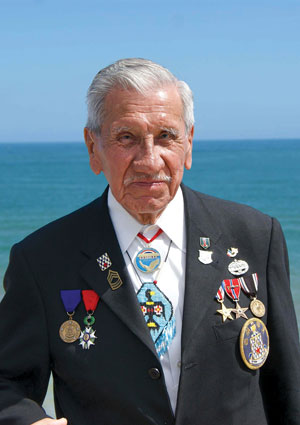July/August 2017 | view this tory as a .pdf
Penobscot Indian elder Charles Shay’s heroism on Normandy Beach is celebrated on both sides of the Atlantic.
By Haley Snyder
 When Charles Norman Shay, 93, landed on Omaha Beach, Normandy, he was just 19. That day, he held the lives of dozens of other young men in his hands. More than bringing the Maine mystique to the coast of France on June 6, 1944, Shay was riding the waves of history on D-Day as a combat medic in the frontline infantry platoon, charging into one of the largest seaborne landings ever seen.
When Charles Norman Shay, 93, landed on Omaha Beach, Normandy, he was just 19. That day, he held the lives of dozens of other young men in his hands. More than bringing the Maine mystique to the coast of France on June 6, 1944, Shay was riding the waves of history on D-Day as a combat medic in the frontline infantry platoon, charging into one of the largest seaborne landings ever seen.
Born in 1924 on the Indian Island Reservation, Shay is a member of the Penobscot tribe and a direct descendant of Jean-Vincent d’Abbadie de Saint-Castin, the French military officer and Abenaki chief immortalized in Henry Wadsworth Longfellow’s poem The Baron of St. Castine, and for whom the seaport town of Castine is named. Shay’s life echoes with that of his ancestor—both are inexorably linked to France and the Penobscot tribes by their roles in historic battles. Now, both have even been immortalized in verse.
In 2007, Shay, as Penobscot elder, returned for the first time to the Normandy coast and several other World War II sites where he’d served as a young combat medic, accompanied by anthropologists Harold Prins and Bunny McBride.
“When I returned to Omaha Beach, it was difficult for me to believe that 63 years earlier, I had landed in the first wave of the invading troops,” Shay says. “So many had to die or were wounded, and I remained unscathed. I thought I must have had a guiding angel. When I looked across the beaches all those years later, I could still hear the screams and cries of the wounded and dying begging for help. I did what I could to relieve their pain and misery.”
In recognition of his efforts, Shay was given the Silver Star for his service. Later in 2007, he was awarded the Légion d’Honneur, France’s highest decoration for valor, by then-President Nicolas Sarkozy.
For Shay, retirement was never on the cards. He’s spent the past decade traveling back and forth to France in an effort to strengthen Penobscot-French ties while writing his autobiography, Project Omaha Beach: The Life and Military Service of a Penobscot Indian Elder. He also initiated a Maine state law that marks June 21 as Native American Veterans Day, honoring the 25,000 North American Indian veterans who fought in World War II.
This heroic Mainer’s tireless exploits have gained him some fame on both sides of the Atlantic. Caen resident Marie Legrand was so inspired by Shay’s story and his visits to the Normandy coast that she campaigned to establish a memorial park in Shay’s name.
The Charles Shay Memorial Park in Saint Laurent-sur-Mer, overlooking the same beach Shay liberated over 70 years ago, opened in June. Shay attended the opening ceremony in person, accompanied by Chief Kirk Francis of the Penobscot Indian Nation, Prins, McBride, and singer/songwriter Lisa Redfern. Redfern, an award-winning recording artist from Maine, was asked to write a song to mark the event. Inspired by the stories of his life, she wrote Full Circle Fire: The Ballad of Charles Shay. Redfern performed the ballad oceanside, surrounded by members of the Penobscot tribe, veterans, and soldiers from American and French forces.
“I was honored to tell part of his life story in a song. I first sang it for Charles the night we met,” Lisa Redfern says. “It was moving to see how it touched him.”
During the proceedings, Shay performed his own personal tribute to his fallen brothers. “I performed an Indian smoke ceremony [on Omaha Beach],” he says. “I believe I can take up contact with the souls of the men who are still wandering about on the beaches of Normandy, lost.”
Today, on a bluff overlooking the ocean on France’s northern coast, the Charles Shay Memorial Park gazes out over the wide stretch of Omaha Beach to the sea beyond. The space is marked by a blue granite turtle carved by Shay’s nephew, Penobscot Indian artist Tim Shay, and a single plaque. The inscription reads: “In honor of Charles Norman Shay and in grateful memory of the 500 American and Canadian Indian soldiers who participated in Operation Neptune for the liberation of Normandy on D-Day, June 6th, 1944.”





0 Comments